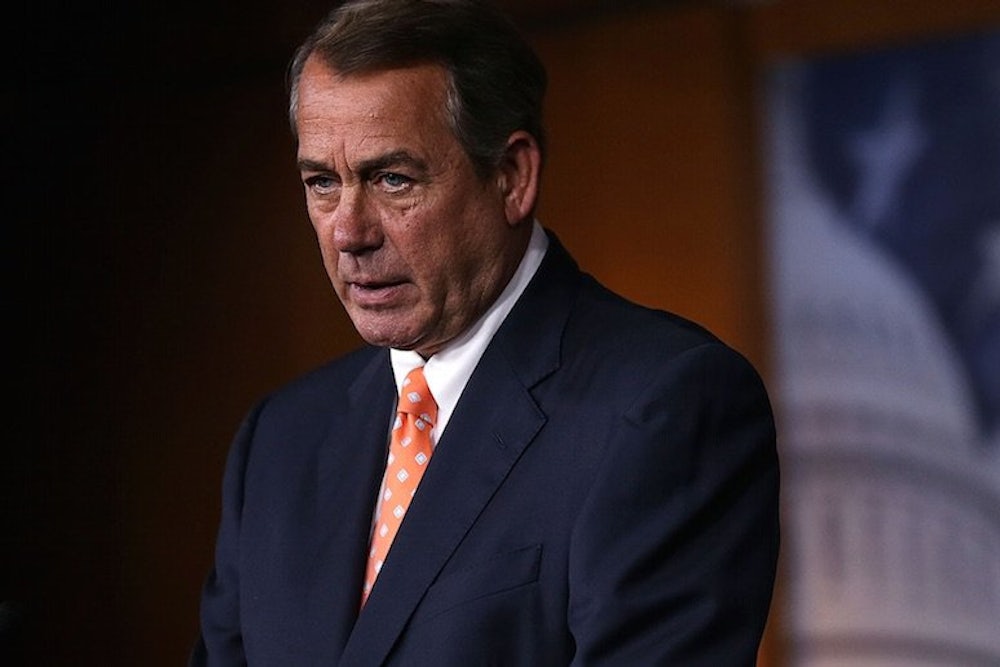For all his flaws, House Speaker John Boehner, who announced on Friday that he will resign from Congress at the end of October, was badly served by a lot of people.
Boehner’s decision is due not to any ostensible scandal or illness but to cruel political mathematics: His conference has become so dysfunctional that when a Republican speaker resigns, the House becomes less, not more, chaotic and reckless. The circumstances that prefigured his resignation are thus a fitting metaphor for his entire speakership and for the state of the Republican Party as a whole. It would be to Boehner’s credit to do everything in his power in the next month to protect his successor from the same fate.
What makes Boehner’s decision surprising is that the forces that drove him to it are familiar enough that they’ve become mundane. Up against a deadline to complete a basic function of government—in this case, to fund it—Boehner found himself beset by conservative demands that he condition Congress’ obligation to help run the country on President Barack Obama's capitulating to partisan demands. This time the demand was to defund Planned Parenthood. In the past it’s been to change immigration policy, slash social spending, and defund the Affordable Care Act. In each instance, Boehner was confronted with a terrible choice: provoke a crisis, like the 2013 government shutdown, or capitulate to Obama, and face repercussions from unruly conservative members, who were constantly threatening to depose him.
These episodes of brinkmanship always resolved themselves, sometimes in damaging ways. In addition to the shutdown, Boehner’s 2011 decision to ransom the statutory debt limit brought the country within hours of an economically devastating credit default, and precipitated an agreement to impose automatic, indiscriminate spending cuts that harm the government and the economy to this day. More recently, he placated his members by embroiling the House in a lawsuit against the president, which, if successful, would precipitate a constitutional crisis. But he always maintained his brittle grip on power. Either he no longer believes he can, or doesn’t want the hassle anymore.
By stepping down, but not for a month, Boehner has freed himself from the poisonous intraparty politics that made it all but impossible for him to govern, and left himself a brief opening in which to settle some accounts, before the next speaker is elected.
If the succession of power goes as it has in recent years, his deputy—Majority Leader Kevin McCarthy of California—will become speaker. A conservative dark horse, like Representative Jeb Hensarling of Texas, could mount a challenge. But any insurgent candidate will have to overcome the fact that the speakership, unlike the majority leadership and other high-ranking posts, is determined by the entire House. Democrats, who can not elect a speaker on their own, are ultimately likelier to assure a victory for McCarthy over the devil they don’t know.
But no matter who comes next, the question is whether they’ll immediately confront the same tawdry dynamic that ultimately felled Boehner, or whether Boehner takes it upon himself to bring some stability to the chamber.
If he takes the path of least resistance, the next speaker will have all the same problems Boehner had, minus his years of experience. That path would end with a brief continuation of government funding—just enough to hand the same political mess over to a new leadership team. It would leave the government no less vulnerable to a shutdown, or another debt limit crisis, or a lapse in highway funding, and the party no less vulnerable to bearing responsibility for a crisis in the middle of election season. Call it Boehner's curse.
Boehner probably can’t end the vicious cycle that hobbled his speakership. But he could plausibly clear the deck for his successor for long enough that the big issues Republicans want to fight over can play out in the election, rather than in the throes of governance. He could place legislation on the floor that funds the government for a year, extends the debt limit through 2016, and replenishes the highway trust fund, and allow Democrats to supply most of the votes required to restore calm. If Boehner were determined to make the next speakership less volatile than his own, and to end his own speakership on a note of responsible stewardship, he almost certainly could. What remains to be seen is whether he has one last fight left in him.
